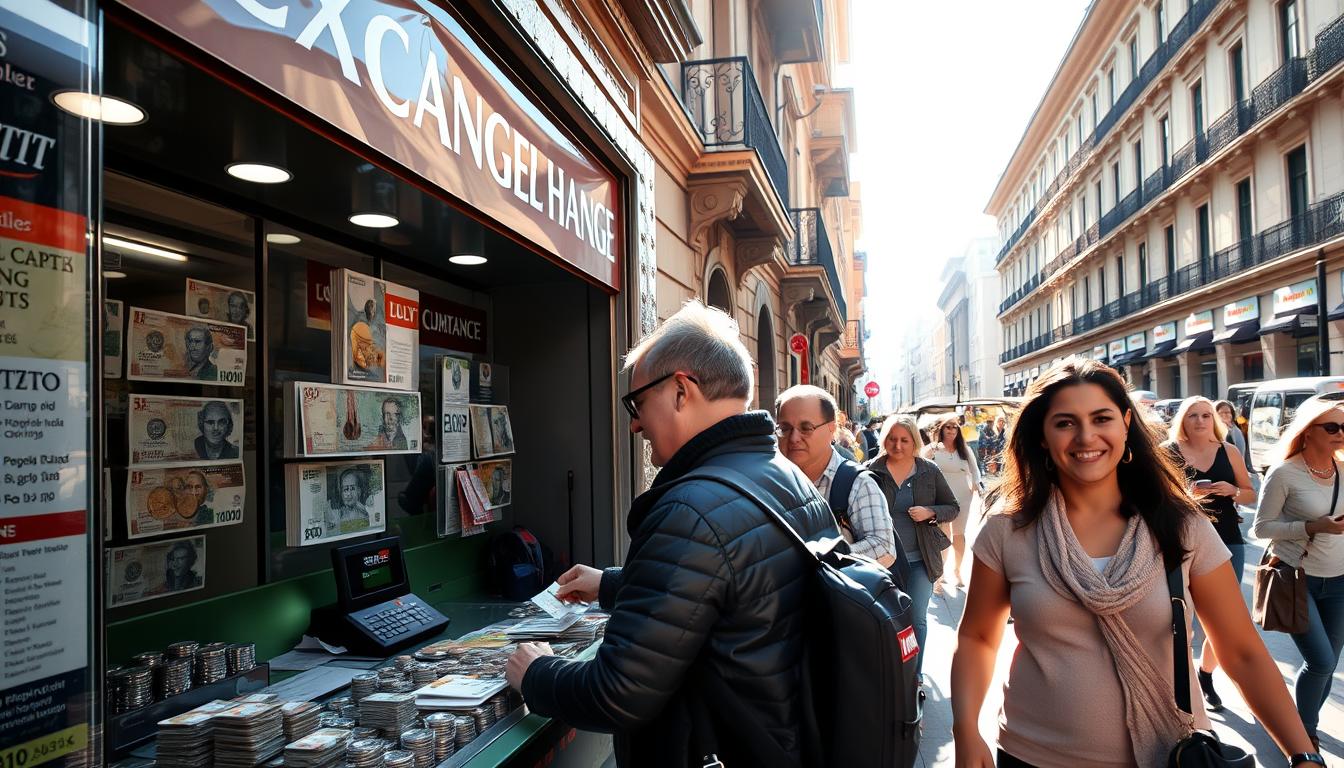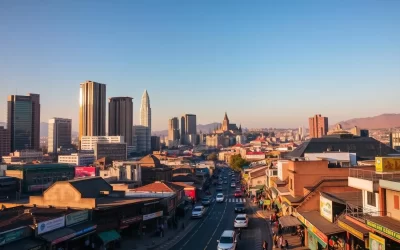✓ Accommodations✓ Flights✓ Rental Cars✓ Tours & Activities
Did you know that the exchange rate can significantly impact your travel budget? For every $100 you exchange, the difference between a good and a poor rate could save or cost you up to $20. This is why understanding how to manage your money is crucial for any trip.
Planning your spending strategy ahead of time can make your journey smoother. Whether you’re using a credit card, withdrawing cash from an ATM, or exchanging currency, knowing the best options can save you time and fees.
This guide will help you navigate the local currency, avoid unnecessary costs, and make the most of your travel experience. From understanding the exchange rate to finding the best places to exchange money, you’ll be well-prepared for your adventure.
Understanding Ethiopian Currency Basics
Understanding the basics of the Ethiopian Birr can make your journey smoother. The official currency is the Ethiopian Birr (ETB), and it’s the only accepted form of payment in most places. Once you arrive, you’ll need to use ETB for everything from markets to hotels.
The Ethiopian Birr is subdivided into 100 cents. Banknotes come in denominations of 1, 5, 10, 50, and 100 Birr, while coins are available in 1, 5, 10, 25, and 50 cents. Familiarizing yourself with these notes and coins will help you avoid confusion during transactions.
When exchanging money, always aim for the mid-market rate. This is the fairest rate and ensures you get the best value for your cash. Avoid dynamic currency conversions, as they often come with hidden fees.
Here’s a quick guide to current exchange rates for the Ethiopian Birr:
| Currency | Exchange Rate (ETB) |
|---|---|
| USD | 39.25 |
| EUR | 46.79 |
| GBP | 54.31 |
| JPY | 0.36 |
Using local currency not only saves you money but also makes your transactions faster and more convenient. Whether you’re paying with cash or a card, knowing the basics of the Ethiopian Birr will help you manage your budget effectively.
Why You Should Exchange USD to ETB Before Your Trip
Planning your finances before departure can save you time and money. Exchanging your USD to ETB ahead of time ensures you’re prepared for your adventure. This simple step can make your travel experience smoother and more enjoyable.
Benefits of Exchanging Ahead of Time
Exchanging currency before your trip offers several advantages. First, you’ll secure a better exchange rate compared to last-minute exchanges. This means more money in your pocket for spending on your journey.
Second, you’ll avoid the hassle of finding a reliable exchange place upon arrival. Having local cash ready allows you to pay for transportation, meals, and other essentials immediately. It’s a smart way to start your trip stress-free.
Avoiding Airport Currency Markups
Airport exchanges are convenient but often come with high fees and poor rates. These markups can significantly increase your costs. By exchanging currency at home, you’ll avoid these unnecessary expenses.
Here’s a quick tip: Use reputable exchange services or banks for the best rates. This ensures you get the most value for your money. Remember, every dollar saved is more to spend on your travel adventures.
Best Payment Options for Your Ethiopian Adventure
Choosing the right payment method can make or break your travel experience. Whether you’re exploring bustling markets or dining at a hotel, having the right mix of cash and cards ensures smooth transactions. Let’s dive into the pros and cons of each option to help you make informed decisions.
Cards Versus Cash Scenarios
Using a credit card or debit card is convenient for larger purchases, like hotel stays or upscale restaurants. Many places in major cities accept cards, but always carry some cash as a backup. Smaller vendors and rural areas often prefer cash transactions.
Travel debit cards, like those from Wise, are a great option. They offer competitive exchange rates and low fees, making them ideal for international trips. Plus, they’re widely accepted at ATMs across the country.
On the other hand, cash is king in local markets and smaller towns. It’s also useful for tipping guides and drivers, which is a common practice. Keep in mind that ATM withdrawals are typically limited to 4,000 Birr per transaction, so plan accordingly.
Combining both methods minimizes risk and maximizes convenience. For example, use your card for big expenses and cash for smaller, everyday purchases. This approach ensures you’re prepared for any situation, whether you’re in a bustling city or a remote destination.
By understanding your payment options, you can manage your budget effectively and enjoy a hassle-free trip. Always carry a mix of cash and cards to cover all scenarios and make the most of your adventure.
Using Debit and Prepaid Cards in Ethiopia
Debit and prepaid cards are excellent options for seamless transactions abroad. They offer convenience, security, and often lower fees compared to traditional methods. Whether you’re exploring bustling cities or remote destinations, having the right card can make your travel experience smoother.
Advantages of Travel Debit Cards
Travel debit cards, like those from Wise, are a popular choice for international trips. They provide real-time currency conversion at competitive rates, saving you money on unnecessary fees. These cards also allow you to hold multiple currencies, making it easy to manage your spending in different countries.
Another benefit is their low cost structure. Unlike traditional banks, travel debit cards often have minimal or no ATM withdrawal fees. This makes them ideal for accessing cash when needed. Plus, they’re widely accepted, ensuring you’re covered in most places.
Selecting the Right Prepaid Option
Prepaid cards, such as those from Travelex, are another great option. They allow you to load a specific amount of money before your trip, helping you stick to your budget. Look for cards with low reload fees and support for multiple currencies to maximize flexibility.
When choosing a prepaid card, consider the service provider’s reputation and fee structure. Some cards offer additional perks like travel insurance or discounts at partner hotels. Always read the fine print to avoid unexpected costs.
Having a prepaid card as a backup ensures you’re prepared for any situation. Whether you’re in a busy city or a remote destination, these cards provide peace of mind and financial security.
Credit Cards in Ethiopia: How They Work and What to Watch For
Using a credit card in urban areas can simplify your transactions, but it’s essential to understand the potential fees. Many hotels, restaurants, and shops in cities accept cards, making them a convenient option. However, hidden charges like foreign transaction fees and cash advance fees can add up quickly.
Foreign transaction fees typically range from 1% to 3% of the purchase amount. These fees apply when you buy something in a different currency. Always check your card’s terms to avoid surprises. Some travel-friendly cards offer no foreign transaction fees, which can save you money during your trip.
Cash advances are another area to watch. If you use your credit card to withdraw cash from an ATM, you’ll likely face high fees and interest rates. It’s better to use a debit or prepaid card for withdrawals to minimize costs.
Here’s a quick tip: Notify your bank before traveling to avoid card blocks. This ensures smooth transactions and prevents disruptions during your travel. Also, compare your card’s terms with other options to find the most cost-effective solution.
By understanding how credit cards work and managing their usage, you can make the most of your spending while avoiding unnecessary costs. Always carry some cash as a backup, especially in rural areas where card acceptance may be limited.
Tips for Exchanging Money Locally in Ethiopia
Exchanging money locally doesn’t have to be stressful if you know what to look for. With a few practical tips, you can avoid hidden fees and get the best value for your cash. Here’s how to make your travel experience smoother and more cost-effective.
Always use licensed money changers for your transactions. These authorized services ensure you receive fair exchange rates and avoid scams. Insist on being charged in ETB at local merchants and ATMs to bypass dynamic currency conversion, which often includes hidden fees.
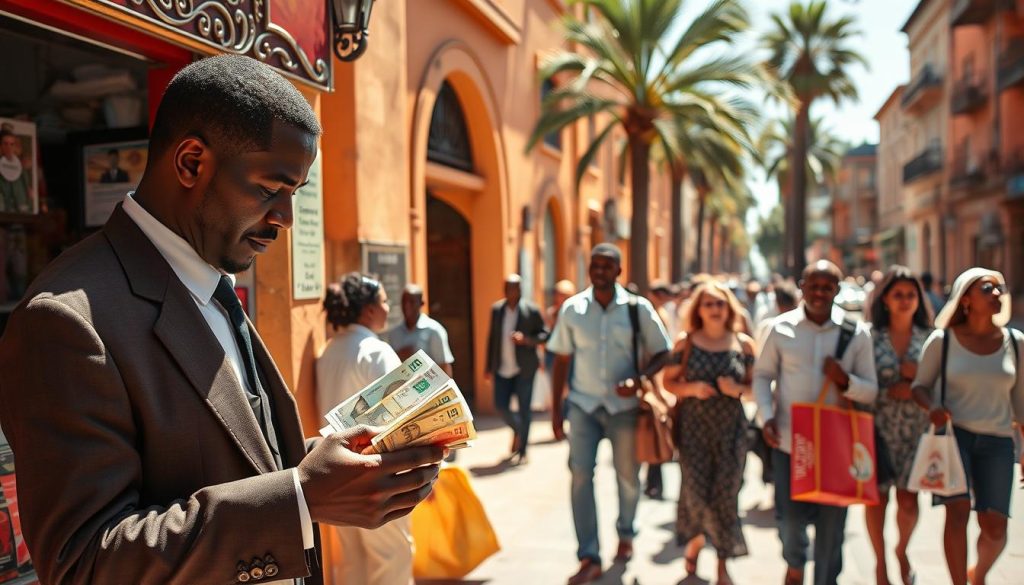
Before exchanging, check the mid-market rate to ensure you’re getting a fair deal. This rate is the most accurate and avoids unnecessary markups. Reputable exchange services or banks are your best option for secure and transparent transactions.
Carry a mix of cash and cards for flexibility. While cards are convenient for larger purchases, cash is essential for smaller vendors and rural areas. This approach ensures you’re prepared for any situation during your trip.
By following these tips, you can manage your money wisely and enjoy a stress-free travel experience. Always stay informed and choose the best way to exchange your currency for maximum value.
Managing Fees and Exchange Rates
Managing fees and exchange rates can save you money and make your trip smoother. Understanding how these costs work ensures you get the best value for your cash. Let’s break down the key factors to consider.
Understanding the Mid-Market Rate
The mid-market rate is the fairest exchange rate available. It’s the rate banks and financial services use when trading currencies. When you exchange money, aiming for this rate ensures you avoid unnecessary markups.
For example, if the mid-market rate for USD to ETB is 39.25, but an exchange service charges 40.00, you’re losing value. Always check the mid-market rate before exchanging to ensure you’re getting a fair deal.
How Markups Impact Your Transactions
Markups on exchange rates can significantly increase your costs. Airports and tourist areas often charge higher fees compared to banks or city centers. For instance, exchanging currency at an airport might cost you 5% more than in a local bank.
Here’s a quick comparison:
- Airport exchange: 5% markup
- City bank exchange: 1% markup
By choosing the right option, you can save a substantial amount over your travel period. Always compare rates and avoid dynamic currency conversions, which often include hidden fees.
With these tips, you can manage your money wisely and enjoy a hassle-free trip. Whether you’re using a card or cash, understanding fees and rates ensures you stay within your budget.
Paying with Cash in Ethiopia: Safety and Convenience
Handling cash during your travels requires a balance of convenience and safety. While it’s essential for tipping and small purchases, carrying large amounts can be risky. Here’s how to manage your money wisely and enjoy a hassle-free trip.
Cash is still the preferred option in local markets, small restaurants, and rural areas. Many vendors don’t accept cards, so having cash on hand ensures smooth transactions. However, it’s important to minimize risks by splitting your funds and using hotel safes for storage.
- Carry only the cash you need for the day.
- Use a money belt or hidden pouch to avoid theft.
- Store extra funds in a secure location, like your hotel safe.
In cities, ATMs are widely available, but withdrawal limits often apply. For example, you may only be able to withdraw 4,000 Birr per transaction. Plan ahead to avoid multiple fees and ensure you have enough currency for your needs.
By following these tips, you can enjoy the convenience of cash while minimizing risks. Whether you’re exploring bustling markets or dining at a local eatery, managing your money wisely ensures a smoother and more enjoyable travel experience.
Handling ATMs and Withdrawal Limits
Navigating ATMs during your trip can be straightforward with the right preparation. Understanding withdrawal limits and fees ensures you manage your money effectively. This guide will help you plan your cash needs and avoid unnecessary costs.
Most ATMs in urban areas allow withdrawals of around 120 USD per transaction. However, limits can vary depending on the bank and your card provider. Planning your withdrawals strategically helps you avoid frequent stops and additional fees.
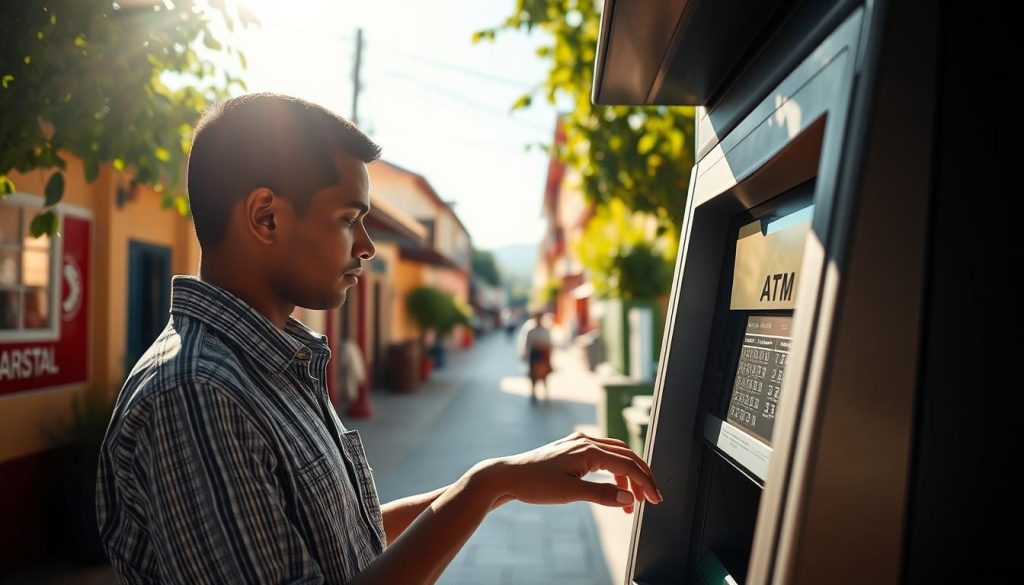
| Card Provider | Withdrawal Limit (USD) |
|---|---|
| Wise Travel Card | 120 |
| YouTrip Travel Card | 120 |
| Local Bank ATMs | 120 |
Using a travel card like Wise or YouTrip can save you money on international fees. These cards offer competitive exchange rates and low withdrawal costs. Always check your card’s terms to understand its limits and fees.
Here are some practical tips for managing your cash needs:
- Plan your withdrawals in advance to avoid multiple fees.
- Use bank-affiliated ATMs for better rates and lower costs.
- Carry a mix of cash and cards for flexibility.
By following these tips, you can handle ATMs confidently and make the most of your travel experience. Whether you’re in a bustling city or a remote area, managing your money wisely ensures a smoother trip.
Utilizing Digital Banking and Travel Apps on Your Trip
Digital tools can transform how you handle money during your trip. With the right apps, you can monitor exchange rates, track spending, and convert currency in real time. These tools make managing your finances easier and more efficient.
Mobile banking apps like Wise allow you to hold multiple currencies in one account. This feature is perfect for international travel, as it helps you avoid unnecessary fees. You can also receive real-time notifications for every transaction, ensuring you stay on top of your spending.
- Monitor exchange rates and convert currency instantly.
- Track your spending with real-time alerts.
- Access your money securely from your phone.
Trusted apps like Wise and Travelex offer low fees and easy conversions. For example, Wise provides competitive rates and allows free ATM withdrawals for a limited number of transactions. This makes it a cost-effective option for travelers.
Setting up these tools is simple. Download the app, link your card, and start managing your finances on the go. Whether you’re in a bustling city or a remote area, having these apps ensures you’re always in control of your money.
By using digital banking and travel apps, you can streamline your spending and enjoy a hassle-free trip. These tools are a smart way to manage your finances and make the most of your adventure.
Staying Secure with Currency Exchanges and Payment Methods
Keeping your money safe while traveling is essential for a stress-free experience. Whether you’re exchanging currency or using a card, taking a few precautions can protect your finances and ensure a smooth trip.
Always verify licensed money changers before exchanging cash. Unauthorized services may offer tempting rates but often come with hidden fees or scams. Checking reviews and asking for recommendations can help you find a reliable option.
Splitting your funds between different wallets or bags is a smart way to minimize risks. If one stash is lost or stolen, you’ll still have access to your money. Additionally, using a hotel safe for extra cash and important documents adds an extra layer of security.
Digital banking apps like Wise or Travelex offer secure options for managing your finances. These apps allow you to monitor exchange rates, track spending, and convert currency in real time. They also provide notifications for every transaction, keeping you informed and in control.
Here are some quick tips to stay secure:
- Use a money belt or hidden pouch for daily cash.
- Avoid displaying large amounts of money in public.
- Notify your bank before traveling to prevent card blocks.
By following these strategies, you can protect your finances and focus on enjoying your travel experience. Staying alert and prepared ensures a safer and more enjoyable trip.
Navigating Payment Services at Hotels, Restaurants, and Local Shops
Knowing when to use a card or cash can make your trip smoother and more enjoyable. Different establishments have varying preferences, so being prepared ensures you’re never caught off guard. Here’s a practical guide to help you navigate payments with ease.
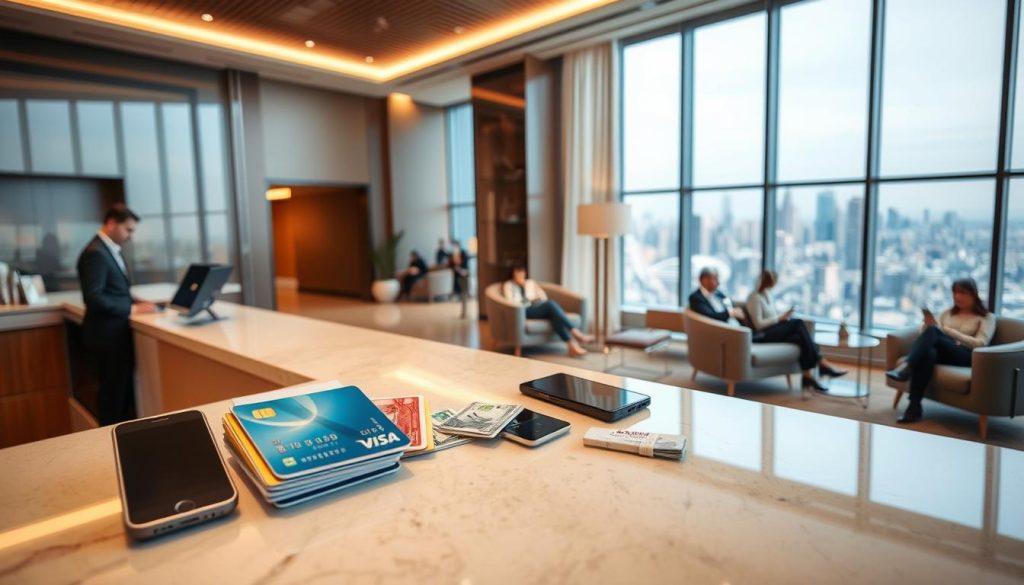
When to Use Cards Versus Cash
In high-end hotels and upscale restaurants, cards are widely accepted. This is a convenient option for larger purchases, as it reduces the need to carry large amounts of cash. However, always check for foreign transaction fees to avoid unexpected costs.
Local markets and smaller shops often prefer cash. This is especially true in rural areas where card machines may not be available. Carrying small denominations of local currency ensures you can pay quickly and easily.
Here’s a quick breakdown of where to use each method:
- Hotels and upscale restaurants: Cards are ideal.
- Local markets and small shops: Cash is preferred.
- Transportation and tipping: Always have cash on hand.
By planning ahead, you can avoid unnecessary fees and ensure smooth transactions wherever you go. Whether you’re in a bustling city or a quiet village, knowing the best way to pay makes your travel experience hassle-free.
Ethiopia: Ultimate Travelers Guide to Currencies & Payments Strategies
Managing your finances effectively during your journey can make all the difference. Whether you’re exchanging currency, using a card, or handling cash, having a clear strategy ensures a smoother experience. Here’s a summary of the best practices to help you stay on top of your money.
Start by exchanging your currency before your trip. This helps you secure a better rate and avoid high fees at airports. Use reputable exchange services or banks to ensure transparency and fairness.
When it comes to payments, carry a mix of cash and cards. While cards are convenient for larger purchases, cash is essential for smaller vendors and rural areas. This way, you’re prepared for any situation.
Here’s a quick checklist to keep in mind:
- Exchange currency before your trip to avoid high fees.
- Use a travel card for competitive rates and low costs.
- Carry small denominations of cash for local markets and tipping.
Always monitor your spending and stay alert for hidden fees. Notify your bank before traveling to prevent card blocks. By following these strategies, you can manage your money wisely and enjoy a hassle-free travel experience.
Managing Your Budget and Daily Spending in Ethiopia
Planning your daily expenses can help you make the most of your adventure. Whether you’re exploring vibrant cities or remote areas, having a clear budget ensures you stay on track without missing out on key experiences.
Estimating Daily Costs
Breaking down your daily spending into categories like accommodation, meals, and transportation can make budgeting easier. For example, a mid-range traveler typically spends around $30 per day, which includes:
- Hotels: $27 per night
- Meals: $11 per day
- Local transportation: $2.85 per day
If you’re a budget traveler, you can reduce costs by staying in hostels, eating street food, and using public transport. Luxury travelers, on the other hand, might spend up to $91 daily for premium experiences.
Here’s a quick tip: Always carry small denominations of cash for local markets and tipping. While cards are convenient for larger purchases, many smaller vendors prefer cash.
Tracking Your Spending
Using digital tools can simplify how you manage your money. Apps like Wise allow you to monitor exchange rates, track spending, and convert currency in real time. These tools ensure you stay within your budget and avoid unnecessary fees.
For example, you can set daily spending limits and receive notifications when you’re close to exceeding them. This way, you’ll always know where your money is going.
By planning ahead and using the right tools, you can enjoy a stress-free trip while staying within your budget. Whether you’re in a bustling city or a quiet village, managing your daily spending ensures a smoother and more enjoyable experience.
Final Preparations for a Smooth Transaction Experience
Before you set off on your journey, taking a moment to finalize your financial preparations can save you from unnecessary stress. A little planning ensures every transaction goes smoothly, letting you focus on enjoying your trip.
Start by confirming your cards are activated for international use. Many banks require this step to prevent blocks upon arrival. Double-check withdrawal limits and fees to avoid surprises. This simple step can save you money and time.
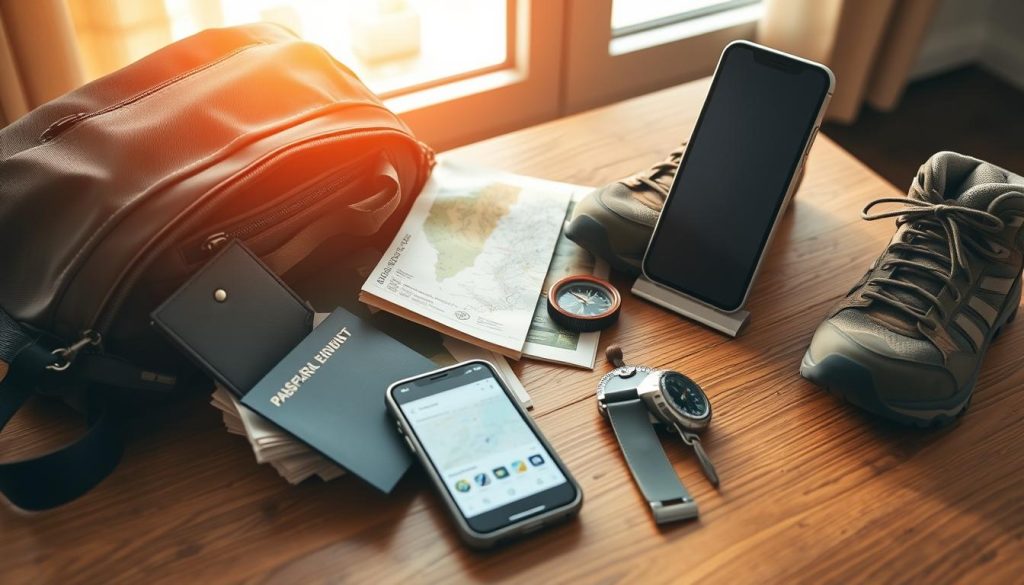
Next, ensure you have enough cash on hand for immediate expenses like transportation or meals. While cards are convenient, some places may only accept cash. A mix of both is the best way to stay prepared.
Update your digital banking apps and ensure they are functioning properly. Apps like Wise or Travelex allow you to monitor exchange rates and track spending in real time. This helps you stay within your budget and avoid unnecessary costs.
Here’s a quick checklist to guide your final preparations:
- Activate your cards for international use.
- Confirm withdrawal limits and fees.
- Carry a mix of cash and cards.
- Update and test your digital banking apps.
- Secure your travel documents and make copies.
By following these steps, you can relax and enjoy your travel experience, knowing every transaction will be smooth and hassle-free. A little preparation goes a long way in ensuring a stress-free adventure.
Conclusion
Being prepared with the right financial tools can make your journey stress-free. Review your payment options, budget planning, and security measures one last time to ensure a smooth experience. Whether you’re using a card or carrying cash, having a clear strategy helps you avoid unnecessary fees and stay within your budget.
Pre-planning is key to managing your money effectively. From understanding currency exchange rates to choosing the best payment methods, these steps ensure you’re ready for any situation. Being informed and prepared not only saves you time but also enhances your overall travel experience.
With these tips in mind, you can focus on enjoying your adventure. A little preparation goes a long way in making your trip memorable and hassle-free. Safe travels!
The above is subject to change.
Check back often to TRAVEL.COM for the latest travel tips and deals.
